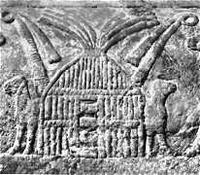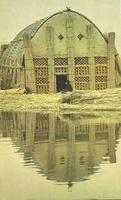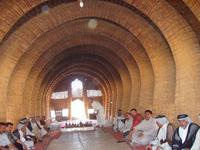O.E. hus "dwelling, shelter, house,": cf. O.N., O.Fris. hus, Du. huis, Ger. Haus, of unknown origin, perhaps connected to the root of hide (v.). In Goth. only in gudhus "temple," lit. "god-house;" the usual word for "house" in Goth. being razn.
Ismeretlen eredetűnek mondja. Lehetségesnek tartja, hogy az 'eltakar, elfed' jelentésű igéből fejlődött ki, és összefüggésben áll pl. a bőrrel:
O.E. hydan, cf. Gk. keuthein "to hide, conceal", from base *(s)keu- "to cover, conceal" ... O.E. hyd, cf. O.N. huð, O.Fris. hed, M.Du. huut, Ger. Haut "skin", related to O.E. verb hydan "to hide," the common notion being of "covering,", cf. Skt. kostha "enclosing wall," skunati "covers;" Arm. ciw "roof;" L. cutis "skin," scutum "shield," ob-scurus "dark;" Gk. kytos "a hollow, vessel," keutho "to cover, to hide," skynia "eyebrows;" Rus. kishka "gut," lit. "sheath;" Lith. kiautas "husk," kutis "stall;" O.N. sky "cloud;" M.H.G. hode "scrotum;" O.H.G. scura, Ger. Scheuer "barn;" Welsh cuddio "to hide".
 Szumír ku 'helyez, elhelyez, letesz, ül, letelepedik, lakik'
Szumír ku 'helyez, elhelyez, letesz, ül, letelepedik, lakik'
 Szumír ku 'bőr' (emberé, gyümölcsé, de az állat kikészített bőre is)
Szumír ku 'bőr' (emberé, gyümölcsé, de az állat kikészített bőre is)
A szumír kud3 jelentése ugyancsak 'helyez, elhelyez, letesz, ül, letelepedik, lakik'
Kud 'nádfal, gallyfonadék, ketrec'
 Szumír nádfalú építmény: eleinte ilyen házakban lakhattak, kihasználva a Folyamköz nádbőségét
Szumír nádfalú építmény: eleinte ilyen házakban lakhattak, kihasználva a Folyamköz nádbőségét

A khúzisztáni mocsári arabok ma is hasonló "nádpalotákban" laknak
'Nádtorzsa' jelentésű kotú szavunk őrizhette meg ezeknek a korai időknek az emlékét

Mudhif is a traditional reed house made by the Madan people (also known as Marsh Arabs) in the swamps of southern Iraq. In the traditional Madan way of living, houses are constructed from reeds harvested from the marshes where they live. A mudhif is a large communal house, paid for and maintained by a local shiek, for use by guests or as a gathering place for weddings, funerals, etc.